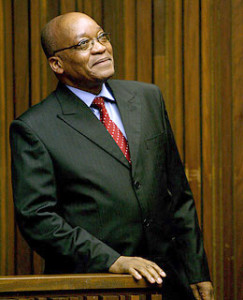Zuma rescue plan for motor and textile industries
THE government will offer support to struggling motor industry companies and a rescue package for the clothing and textile industry, President Jacob Zuma announced last night.
It will also set aside R2,4-billion from the skills and unemployment insurance funds to help ease the strain on workers retrenched as a result of the global and domestic economic downturn.
The motor industry has been in decline for more than two years.
Zuma’s office said, after a meeting of a task team set up late last year to respond to the crisis, that recent data showed that the global slowdown was “biting deep in South Africa”.
“Growing job losses and rising indebtedness required clear and purposeful action to respond to the needs of the people,” it said.
Zuma said key responses included offering support for distressed companies in the automotive sector and a rescue package for clothing and textile companies.
The government would also increase incentives for the manufacture of capital equipment, transport equipment and fabricated metals linked to the multi-billion-rand infrastructure development programme.
The Industrial Development Corporation would make available R6- billion over two years to deal with the effects of the crisis, he said.
The state and its utilities, including Eskom, plan to spend R787-billion over the next three years to boost infrastructure.
Economic Development Minister Ebrahim Patel said the Trade and Industry Department would give specifics on the automotive sector support and the textiles rescue package within the next two weeks.
Applications would be administered by the Commission for Conciliation, Mediation and Arbitration. There would also be rules guiding the granting of training lay-offs, as well as limits on executive pay and shareholder returns.
Under the scheme announced by Zuma, the government will pay half a worker’s basic pay, up to R6239 a month, for companies to train affected employees.
This will be only for workers earning less than R180000 a year.
Setting up a training lay-off scheme was an alternative to retrenchment for workers and companies affected by the recession.
The scheme, set to start next month, would entail taking people out of their workplaces temporarily to train them.
The maximum period for a training lay-off would be capped at three months.
Patel said possible training activities would be in line with the person’s current employment. This was to enhance their skills once they returned to work.
The government would encourage training in information communication and technology, as well as basic literacy and numeracy.
The money would come from the National Skills Fund and the Unemployment Insurance Fund. Additional money would come from existing industry training institutions that are also funded by levies.
Zuma said: “While significant technical work has been done and important progress made, implementation needs to be speeded up so that the effects of this work will begin to be felt by the population.”
Trade unions, which have heaped pressure on Zuma since his inauguration in May, said they were happy with the measures proposed.
Cosatu secretary-general Zwelinzima Vavi said: “The government has come seriously to the party, driving the process at the highest level.”
Steps to deal with the recession included strengthening the SA Revenue Service’s ability to address customs fraud, which had led to many job losses.
The government also intended making payments to small, medium and micro enterprises and other businesses within 30 days.
The National Debt Mediation Association, a business initiative to help the indebted, had been established to provide rules, standards and processes to help debt restructuring.
Sourced via Reuters








